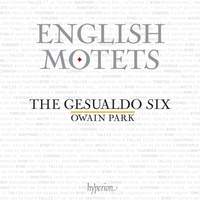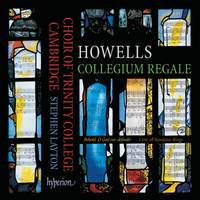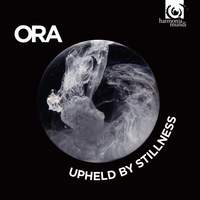Interview,
Owain Park on English Motets
 Formed in 2014 for a one-off performance of Lenten music by Carlo Gesualdo, the Gesualdo Six have since developed into one of the most acclaimed consort groups in the UK, performing repertoire ranging from the well-trodden paths of early music up to the contemporary - conductor and founder Owain Park himself being a composer of some note.
Formed in 2014 for a one-off performance of Lenten music by Carlo Gesualdo, the Gesualdo Six have since developed into one of the most acclaimed consort groups in the UK, performing repertoire ranging from the well-trodden paths of early music up to the contemporary - conductor and founder Owain Park himself being a composer of some note.
For their début album, the Gesualdo Six have chosen repertoire reflecting the breadth and richness of the English Tudor period - a mixture of well-known favourites and less commonly-performed works, but all playing to their strengths as a single-voice all-male ensemble with a spotless collegiate pedigree.
I spoke to Owain about what went into this album, and about some of his ambitious future plans for the ensemble...
This was a time when it could reasonably be said that English composers were among the most renowned in the world, yet subsequent centuries saw the nation’s reputation decline to the point of being regarded as “The Land Without Music”. Do you think the religious upheavals of this time somehow stimulated musical innovation?
This period was certainly a fruitful time for composition, aided by the advent of printing, on which William Byrd and Thomas Tallis were able to capitalise. Tallis was particularly skillful at reinventing his works in response to the shifting religious requirements; the musical quality remains absolutely consistent, even while his style changes dramatically. Lavish Catholic services required suitably elaborate music, with Latin words and rich sonorities. The Protestants did away with such excess, and as the walls were whitewashed so too was the music, with demands placed on composers to set English words as simply as possible, so that every syllable could be clearly heard by the congregation. Then, in Queen Elizabeth I’s reign, came a kind of relaxed simplicity, a halfway house, in which the ideal was both that the words could be heard clearly and also that the music should be interesting. This was one of the most turbulent periods in English history, and composers were obliged to write in the musical style of the moment, so it is fascinating to discover what they came up with.
Of course, no man or compositional school is entirely an island – even those originating in island nations… Do you think there are discernible influences on these composers from the other Continental musical “schools” of the time (and indeed vice versa)?
John Taverner’s Quemadmodum is an interesting work to analyse in this regard, as the music reflects a move away from the florid pre-Reformation techniques used in older Tudor compositions (evident in the works included by Dunstable and Cornysh), to a pared-back style more influenced by continental composers. Whilst Taverner’s setting survives only in instrumental form, its origins are clearly as a vocal work; it is wonderfully refined in its use of imitation and its seamless manipulation of the polyphonic texture – the six parts spinning out long melismatic lines. Parallels can be drawn between works written on these shores and those by continental composers, but with such a dramatic fluctuation in the religious landscape necessitating constant reinvention from the composers, it is just as rewarding to examine the presented works as a linear journey through the motet form and explore the development of the genre from florid medieval-sounding works by Dunstable and Cornysh, intricately woven polyphonic works by Tallis and Sheppard, to the beautiful simplicity of Tomkins and White.
This musical period is, as any choral singer will know, an enormously rich and extensive treasure-trove of works. How did you decide which to feature, and which (including some real “hits”) to omit from this album?
My aim was to showcase something of the extraordinary journey composition took around the English Reformation, and in turn reflect our immense enjoyment in performing the music we all grew up singing. The presented order is not a linear journey, but a grouping akin to a concert programme, where a balance of fast and slow, similarity and contrast is all brought into play.
It’s not stretching things much to say that England is currently in the midst of something of a Golden Age of high-quality chamber choirs. This is of course marvellous for music-lovers but it means that for the choirs themselves, competition is quite fierce. What do you feel sets the Gesualdo Six apart from the crowd?
The ensemble was formed in Cambridge for a one-off concert of music by Carlo Gesualdo, hence the name appearing on a poster and subsequently sticking! We immensely enjoyed this first experience and continued performing a lot in Cambridge before going on the road for our first Summer Tour: ten concerts in nine days! Overall, it is a love of the music and of performing together that comes across in our concerts with a unique balance of blend and individual character from the voices.
The existence of an English-themed album might be taken, by an optimistic crystal-ball-gazer, to imply future instalments looking at other Renaissance schools – enough to keep you busy for several years at least! Can you tell us anything about your future plans?
Plans for a second CD are already coming together, and we are excited to be building a partnership with Hyperion Records. After running our first Composition Competition in 2016, there are a number of new works we would like to record alongside pieces by György Ligeti, Joanna Marsh and Jonathan Harvey, and two of my own works, Sequence: ‘In Parenthesis’ and Fantasia on English Children’s Songs – both of which will be familiar to our concert-goers! Naturally, some of our favourite repertoire for Advent and Christmas is also on the cards…
'English Motets' was released on Hyperion in March 2018.
Available Formats: CD, MP3, FLAC, Hi-Res FLAC
Trinity College Choir's recording of choral and organ works by Herbert Howells (including the complete 'Collegium Regale' settings), from Owain Park's time as Organ Scholar there.
Available Formats: CD, MP3, FLAC, Hi-Res FLAC
The first volume of ORA's series of discs pairing Renaissance masterworks with contemporary choral pieces written in response to them - featuring Owain Park's eponymous composition Upheld by Stillness and works by Roxanna Panufnik, Roderick Williams and others, juxtaposed with choral works by Byrd.
Available Formats: MP3, FLAC, Hi-Res FLAC





